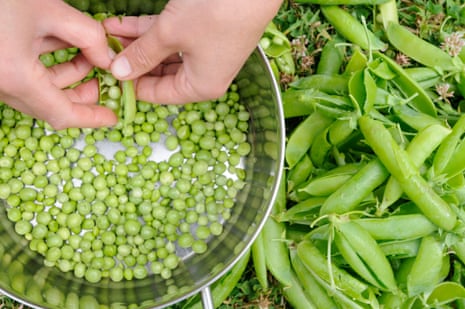If some cooks take pleasure in even the most boring tasks, I’m not one of them. Peeling potatoes, slicing carrots, making stock: I cannot do these humdrum, tedious things without the aid of a glass of wine and the radio. And the faster I whip through them, the better. Every evening is a race. I leave my desk at 7pm, and thereafter my eye constantly flicks to the clock as I work out if I can finish removing the thickest of the stalks from the kale and get the pasta on before The Archers is over. I guess you could say that I’m a journalist, programmed to run to deadlines, even in the kitchen.
I envy those who find nothing so companionable as a bowl of peas to be podded. I’d like to be one of them, calm and steady and noticing: the kind of person who would rather eat a Pot Noodle than leave a quince to rot in their fruit bowl, as I sometimes do. Even better would be to go one step further and become the sort of earthy yet lyrical human being who looks at slices of potato for a gratin, and sees the tiles of a roof, milk splashing on them like rain; who watches leaves of radicchio unfolding in a pan and thinks of a human palm, pink and gently lined; who finds the stench of wild garlic when pounded so crazily intoxicating that her head fills alarmingly with thoughts of Medea and all her crimes.
I’ve nicked these few images – not the Pot Noodle, but the others – from Sean Borodale, a poet whose new collection, Human Work, is published this month. I hardly ever read contemporary poets, and I know almost nothing about this one save for the fact that his first collection had to do with keeping bees; that he lives in or near Cambridge, where he appears to have space enough to grow his own fruit and vegetables; and that he looks, judging by his author photograph, like the really handsome one who never quite managed to join the Charlatans, probably on account of the fact he was too clever and thought he should go to university instead (by which I mean: he has cheekbones like chalky cliffs, and hair so thick and dark, if your fingers went for a walk in it they would definitely not return within the hour).
Human Work, a collection of poems that was written entirely in the kitchen, was sent to me by his publisher, who knows of my somewhat niche interests, and as you may have gathered by now, it has pierced me like an arrow (or, perhaps, a skewer). If you love cooking, and words, and you wish, as I do, that you had more time for your hands and all the tasks you’ve taught them to perform, this book, given half a chance, will soon be engraved on your heart.
At first I read it like the English student I used to be, wondering at its cleverness, trying my utmost to unfurl every line. Then I started it all over again, devouring it, this time, as if it were a recipe book, albeit one that is a little imprecise in the matter of measurements.
Poets are never rich, and this is a book of making do, of improvisation, foraging and cheap cuts, something that makes it seem at once quaint and yet terribly modern: hipster with dashes of Florence White (I think my very favourite poem is the one in which Borodale describes making oxtail stew, “Plate, clink, divide between bowls; nearly elegant,/ the strange matter of vertebra/ perplexing, prehistoric…”).
Pretty soon, I found that I was hungry, any minor disagreements I had with it – broccoli stalks? in stock? – quickly fizzling in the face of Borodale’s cunning ways with damsons and artichokes. Crikey. As poets go, he seems to be the kind you would really want to have hanging around.
There is one very short poem: ‘Blackcurrant leaves steeped in cream’ (“When I strain off/ the ruined leaves/ it’s like the heat of a body/ left in a bed.”)
Its puzzle is culinary, not literary. What do blackcurrant leaves taste like, and why would you steep them in cream? Is it the cream you’re to eat, or the leaves? The title suggests it’s the leaves, but the poem tells you it’s the cream that’s the thing. So would you pour it over the fruit, or turn it into something else (ice cream?) altogether? All day I kept reading it. By tea time, I could recite it from memory: “As they go/ into the cream/ it’s like the cream has heard.” As I write, I still haven’t solved the mystery of the blackcurrant leaves. But these scant, rather sinister lines have had a good effect. They make me want to approach the pot slowly, on tiptoe, the better to take it by surprise.

Comments (…)
Sign in or create your Guardian account to join the discussion